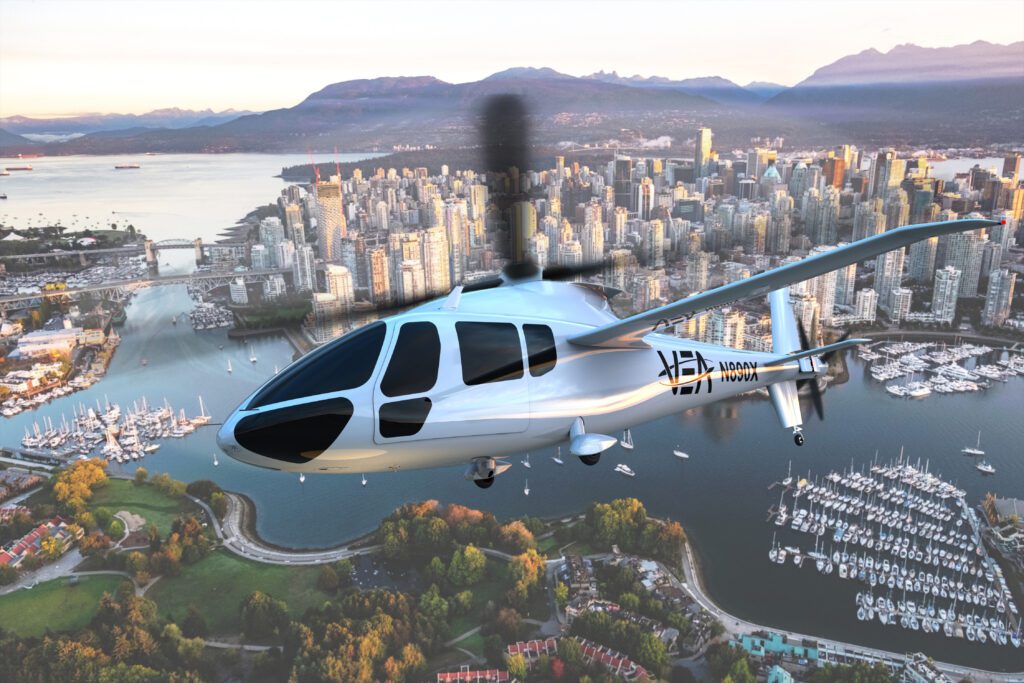
HyPoint and Piasecki Aircraft have formed a new partnership to develop a hydrogen fuel cell system for eVTOL aircraft (Piasecki)
With aircraft emissions and sustainability becoming a leading concern in the industry, the development of electric aircraft, like electric vertical takeoff and landing (eVTOL) aircraft, has accelerated. However, most of these aircraft are depending on lithium-ion batteries, which are generally heavy and not energy-dense. A new partnership between HyPoint and Piasecki Aircraft aims to solve this problem.
HyPoint and Piasecki Aircraft have formed a new partnership to develop a hydrogen fuel cell system for eVTOL aircraft that will provide four times the energy density of existing batteries, twice the power of existing hydrogen fuel cell systems, and a 50 percent reduction in operating costs, the companies announced in an Aug. 24 press release. If successful, the companies hope to develop the world’s first manned hydrogen-powered helicopter.
“The much-anticipated arrival of eVTOLs and similar aircraft has been severely hindered by the technical limitations of existing power systems,” Alex Ivanenko, founder and CEO of HyPoint, said in a statement. “This new strategic partnership will dramatically accelerate delivery timelines by equipping eVTOL manufacturers with next-generation hydrogen fuel cell systems that meet their unique needs. Together, HyPoint and Piasecki will work to grow the emerging eVTOL market by delivering a certified multiplatform solution for eVTOL makers. In addition, we share a common vision for making safe, cost-effective zero carbon-emission flight a reality for conscientious businesses and consumers around the world.”

Piasecki is working with the Federal Aviation Administration and the U.S. Air Force on certification criteria for its aircraft. (Piasecki)
The $6.5 million agreement will first develop five 650kW hydrogen fuel cell systems for Piasecki’s eVTOL PA-890 Compound Helicopter. Piasecki will retain an exclusive license to the technology created during the partnership and both companies aim to make a new system available for purchase to eVTOL makers that will be customized to their individual aircraft.
According to HyPoint, its system will be able to get 2,000 watts per kilogram of specific power and will have up to 1,500 watt-hours per kilogram of energy density. HyPoint uses compressed air for cooling and oxygen supply to achieve these results.
Piasecki is working with the Federal Aviation Administration and the U.S. Air Force on certification criteria for its aircraft.
“We are laser-focused on the development and qualification of a 650kW system for our PA-890 eVTOL Compound Helicopter, which would be the world’s first manned hydrogen-powered helicopter. Success will pave the way for collaboration with other eVTOL OEMs with different platform sizes to ensure broad application of this technology,” John Piasecki, President and CEO of Piasecki, said in a statement. “Initial lab testing funded by Piasecki last winter demonstrated the technical viability of HyPoint’s hydrogen fuel cell system. While we are benchmarking HyPoint’s technology against alternatives and continue to rigorously test and validate findings, we are very optimistic. Our objective is to develop full-scale systems within two years to support on-aircraft certification testing in 2024 and fulfill existing customer orders for up to 325 units starting in 2025.”